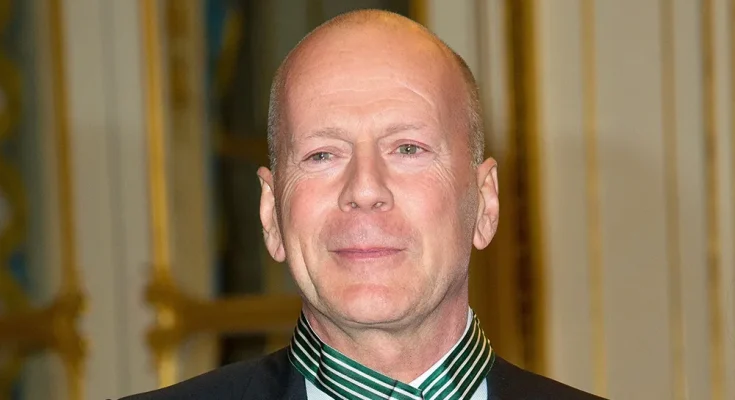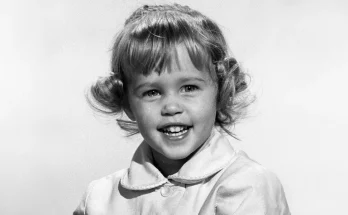At 65, Bruce Willis, a towering figure in action and Hollywood dramas, has officially retired from acting, leaving a deep impression on fans worldwide. Known for his sharp humor and everyman charm, Willis redefined the action genre with iconic roles in Die Hard, Pulp Fiction, and The Sixth Sense. His decision to retire, however, is not merely a matter of age or stepping back after a successful career. Willis faces a daunting health condition, aphasia, which has impacted his ability to communicate, making retirement both a challenging yet necessary choice.
Born in 1955 in a small village in Germany to a military family, Willis experienced the discipline of a military upbringing, eventually moving with his family to New Jersey. Life for young Bruce was grounded in family and education rather than the spotlight. Even as a child, his innate charisma shone through, and his love for humor quickly became a defining feature. But Willis was also challenged by a stutter, which made interactions difficult.
Remarkably, this speech difficulty vanished whenever he was on stage. This discovery was transformative for Willis, who, by high school, began taking acting seriously as a means of expressing himself fully. His journey into acting was marked by resilience; after high school, he attended Montclair State University for drama and juggled odd jobs to support himself.
His big break came when he landed the role of David Addison in Moonlighting in 1985. Competing against thousands of other hopefuls, Willis was chosen to star opposite Cybill Shepherd in the romantic detective series, which quickly became a hit. Willis’s humor and on-screen chemistry with Shepherd helped make Moonlighting a phenomenon, setting the stage for his eventual crossover into film.
The late 1980s marked Willis’s transition to movies, beginning with his landmark role in Die Hard (1988), which set him apart from other action stars of the era like Arnold Schwarzenegger and Sylvester Stallone. As New York cop John McClane, Willis offered audiences something new: a relatable, vulnerable action hero who felt more human than the larger-than-life action figures audiences were used to seeing.

Die Hard became a smash hit, with Willis portraying a character who was far from invincible—he bled, he struggled, he cracked jokes to cope. McClane’s relatability was a refreshing shift, and Willis’s portrayal redefined the contemporary action hero.
Willis quickly became a household name, but he resisted being typecast as just an action star. In Pulp Fiction (1994), under the direction of Quentin Tarantino, he played Butch Coolidge, a boxer facing a moral and life-threatening dilemma. This role showcased his ability to navigate darker, more complex characters.
In The Sixth Sense (1999), Willis’s role as Dr. Malcolm Crowe, a child psychologist haunted by his past, showcased his more reflective side and demonstrated emotional depth that wowed audiences. The film’s plot twist became legendary, and his nuanced performance helped the film become a cultural phenomenon.
In 2000, Willis teamed up with director M. Night Shyamalan again in Unbreakable, playing David Dunn, a man grappling with his seemingly indestructible nature. This role, far from the typical superhero archetype, explored themes of vulnerability and resilience.
Willis’s ability to portray depth and subtlety in these roles solidified him as a versatile actor, capable of moving seamlessly from intense action sequences to introspective, layered dramas.
In recent years, Willis began facing challenges that were more personal than professional. In March 2022, his family shared the difficult news of his aphasia diagnosis. Aphasia is a condition affecting communication skills, making speaking, writing, and sometimes even understanding words difficult. For an actor who built his career on memorable lines and delivering nuanced performances, aphasia was particularly devastating.
Bruce’s family, including his wife Emma Heming Willis, ex-wife Demi Moore, and his five daughters, have stood by him, supporting him through this difficult period. They issued a joint statement announcing his retirement and expressing gratitude for the outpouring of support from fans worldwide.
Willis’s journey with aphasia has not been easy. The condition affects the language centers in the brain, gradually worsening over time and making even daily communication challenging. As his health condition progressed, Willis’s roles became smaller, and directors often tailored parts to accommodate his limitations, allowing him to continue acting despite increasing difficulties.
This allowed him to remain close to the craft he loved, but his family and friends understood when it was time to put his health first. The decision to retire was not made lightly; for Willis, acting was more than a job—it was a calling, a way to connect with audiences and a profession he took great pride in.
Willis’s career is a testament to his adaptability and dedication. He leaves behind a rich body of work, spanning action, drama, thriller, and even comedy. His role as John McClane in Die Hard remains an indelible part of action cinema, a benchmark that every subsequent action hero is measured against.
His performances in films like Pulp Fiction, The Sixth Sense, and Unbreakable showcase his range as an actor capable of moving beyond the action hero archetype. He brought authenticity and depth to every role, making each character he played resonate with audiences.
Willis’s retirement marks the end of an era, but his influence will continue to shape the film industry for years to come. His work not only redefined action but also bridged genres, proving that an action star could be as reflective and emotionally complex as any dramatic character. Fans and fellow actors alike will remember him not only for his fearless on-screen persona but also for his genuine, grounded nature off-screen.
As he steps back from the spotlight, Willis has the full support of his family, who have rallied together to help him adjust to this new chapter. His wife, Emma Heming Willis, has been open about their journey, expressing gratitude for the public’s understanding and sharing glimpses of their life together. His former wife, Demi Moore, and his daughters have been integral in ensuring he remains surrounded by love and support. This phase may be quieter, but it is one filled with the strength of familial bonds and a focus on Willis’s well-being.
Bruce Willis’s retirement is a bittersweet moment for Hollywood and fans alike. He leaves behind a legacy that few can match, having transformed the image of the action hero and demonstrated a range that few anticipated. While his retirement was spurred by health challenges, his contributions to film endure, with roles that continue to captivate and inspire.
As he steps away from the screen, his fans and loved ones honor not only his impressive career but also his resilience in the face of personal challenges. Bruce Willis may have bid farewell to acting, but his legacy remains an indelible part of Hollywood history, a reminder of the impact one actor can have on generations of audiences.



